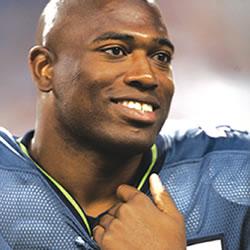Seattle Seahawks running back Shaun Alexander rushed for 1,880 yards and 28 touchdowns in 2005, leading his team to the Super Bowl and earning him the NFL’s Most Valuable Player award.
Most folks expected 2006 to be equally stunning, but in September Alexander broke his foot, which forced him to sit out part of the football season. The team isn’t too excited about the injury, but Alexander is taking it in stride, like he does most everything else.
“I just try to wait for God’s timing,” Alexander says. “I keep things real simple. God’s good though. His timing is flawless.”
For Alexander, life off the field is as important as his career. He is a devoted husband to his wife, Valerie, and a loving father of daughters Heaven and Trinity. These family values came from his mother, Carol, who raised him and his brothers after his parents divorced while he was in the sixth grade.
His $62 million contract, which made him the highest-paid running back in the NFL, also raised eyes. But he has plans to give away much of that money.
“Christians can’t be greedy,” says Alexander, who has big plans to use that money to help others, including his Shaun Alexander Foundation and Club 37, a teen mentoring program that is named after the number on his jersey.
In the following interview, Alexander reflects on his life and his faith.
Q: How much influence has your mother had on your life?
Shawn Alexander:: My mom was just a strong woman of God. …We lived in a two-bedroom apartment and my parents were divorced about the time I was in sixth grade. You’d walk in and you’d see her on the balcony just reading the Bible. … My mom almost made us feel like we weren’t missing that male influence because she took on both roles so powerfully even though there had to have been times of loneliness. … Even still today, cousins and friends still go back to our house, hanging out with my mom … and it’s because she always brought that authentic unwavering love that can only come from God.
Q: What message do you hope your book sends to the youth culture?
SA: I just think that in today’s society, the young people just need some really true, authentic, direct love and obedience. If a person’s missing this and they can get the answer, they would want it straight. If it’s red, give it to me that it’s red. Because then they can make a true choice. But nowadays, it seems like everybody tells them, “It could be brown or green or yellow or red. …”
Q: What did you learn from the experience in 2004 when you were left one yard short of the rushing title and a reporter manipulated you into saying that Coach Mike Holmgren had stabbed you in the back?
SA: I tried to not make it look like it was because I was a Christian that it was so blown out of proportion. I think that the people who are in Seattle and everybody who was there for that whole situation—the ones who know me—knew that if anything, my slang was taken out of context. … I learned that if it could be malicious to you, then it’s wrong. I think that’s a valuable lesson to learn. Sometimes you don’t think it’s wrong because you didn’t do anything that looks wrong in your tradition or your core beliefs. But, if it could be wrong to somebody else, then it is wrong.
Q: Why was it important for you to address financial issues from a professional athlete’s perspective?
SA: People need to understand that God plans even for the financial things. We’re small-changing God. He’ll take care of everything. It’s the whole nine yards. He’ll give you the big contract if it is designed for you to have the big contract. … It all came back to my focus on Him. That’s what I want everyone to understand. Make your first choice Jesus Christ and then let God do the rest.
Q: How does it feel to be called MVP?
SA: It’s always good. … I wouldn’t mind being called MVP again next year. But at the same time it really humbles me to say, “OK God, I want to make sure that I’m Your MVP first.”
Q: Are you ever concerned that people might confuse your deliberate style of contract negotiations for greed?
SA: I think that if a person is not saved and he makes a good business decision, then he’s called a great businessman. But if a Christian man makes the same decision, he gets called greedy. Somewhere in the world’s mind, Christians have to be weak. They can’t go out and win the game, and they have to be poor. … I just don’t believe it. … My idea of what a Christian is can’t be greedy. A Christian can’t be greedy because everything he does is to help others. So if you make more [money], you just allowed yourself to help more people.
Q: What’s inspired your desire to work with young men?
SA: I just realized that there was a value in somebody with stability and focus imparting life into somebody else. I don’t have to change the world, but it’s a powerful thing when I speak into somebody else’s life. I think that’s one of my callings. That’s a powerful thing. You can speak a lot of things into people’s lives, and they will grab hold of it.
Q: What’s going on with your fledgling mentoring program, Club 37?
SA: We have the future running through this program. We have future presidents down the road. We have future men of integrity—future vice presidents and presidents of companies, future football stars. They are the next mentors of the world. That’s the heartbeat.
The introduction and Q&A section were adapted from material written by Chad Bonham, a freelance journalist in Broken Arrow, Oklahoma.




